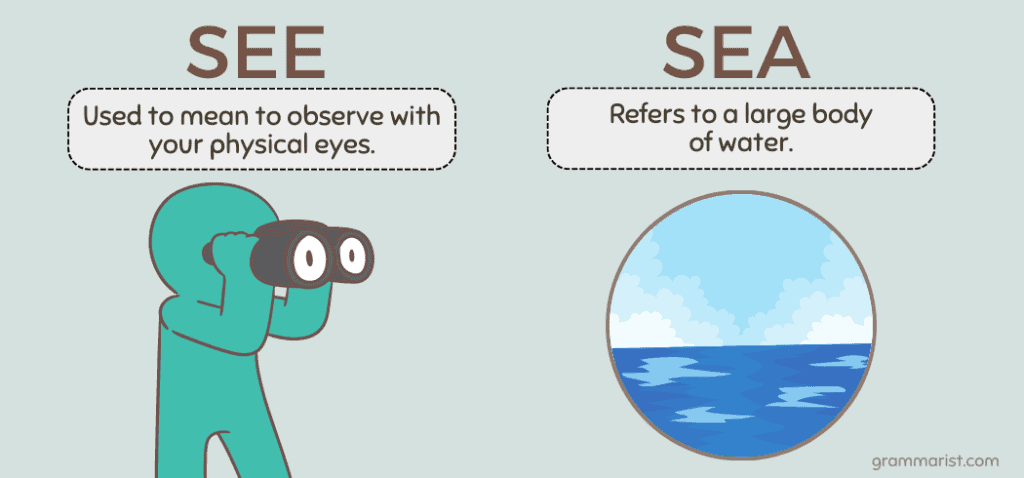Are you feeling a bit seasick when trying to differentiate between ‘see’ and ‘sea’? Don’t worry; you’re not alone!
My guide will look at how these homophones (words that sound alike but have different meanings) are used in various contexts. Understanding their differences will help expand your English vocabulary and ensure you express yourself accurately when speaking or writing. Let’s dive in!
Is It See or Sea?

While the words “see” and “sea” are homophones, they have entirely distinct meanings. The verb “see” is used to mean to observe with your physical eyes or to understand a given concept. For example, one could say that they see a beautiful sunset when watching a stunning evening sky.
On the other hand, the noun “sea” refers to a large body of water. It is also sometimes used as a metaphor for vastness or a concept one cannot comprehend due to its great size.
What’s the Difference Between See and Sea?
The English language is rich and unique, with many similar-sounding terms for describing the same thing. Such is the case with “see” and “sea”; two words that are both nouns, but each carries vastly different meanings.
See refers to vision, which can be thought of as a mental image or perception, while sea is a term used to refer to a large body of salt water that’s smaller than an ocean.
Are See and Sea Homonyms?
The words “see” and “sea” are homophones rather than homonyms.
Homonyms share the same spelling and pronunciation but have different meanings. Homophones sound the same but have different meanings and spelling.
They sound the same but have different definitions. This is an example of a common homophone pair in English. Knowing when to use which one is essential for effective communication so as not to confuse your audience.
Why Are See and Sea Pronounced the Same?
Although they are spelled differently and have vastly different meanings, they are pronounced the same. This is because they are homophones, meaning they share the same sound when spoken.
“See” and “sea” are a part of a larger group of homophones with similar pronunciations such as “pair” and “pear,” “meat” and “meet,” or even “foreword” and “forward.” These words may appear difficult to keep apart, but they can easily be distinguished by their spelling.
What Kind of Words Are See and Sea?
See and sea are homophones, meaning they sound the same but have different definitions and spellings.
See is typically used as a verb to mean “to perceive something through the eye.” For example, one may say, “I see a book on the table.”
Sea, on the other hand, can be both a noun and an adjective describing things related to bodies of salt water, illustrating grand expanses of vastness. For instance, one might exclaim, “The waves of the sea make such a beautiful rhythm!”
Examples of “Sea” in Sentences
Here is how to use the word “sea” in sentences:
- The sea was as calm as a cloud.
- We could see the sun setting over the sea.
- After a long day at work, I can’t wait to go home and relax by the sea.
- The sounds of the sea crashing against the rocks is so soothing.
- I’m not a very good swimmer, so I avoid going into the sea.
- There’s something about the sea that just makes me feel so peaceful.
Examples of “See” in Sentences
You can see how to use the word “see” in these sentences:
- I see what you mean.
- Do you see that car?
- I can’t see anything without my glasses.
- I don’t see the point of this exercise.
- You’ll see – everything will be fine.
- Let me see if I can find the right words to explain this.
The Bottom Line
“See” is a verb that means observing something with one’s own eyes or understanding a concept intellectually. On the other hand, “sea” is a noun that refers to a vast body of salt water larger than a lake or large river and found on Earth’s surface between land masses. Both words have linguistic roots in Old English. However, they serve distinctly different purposes in communication today.
